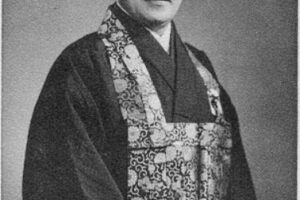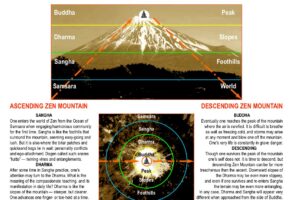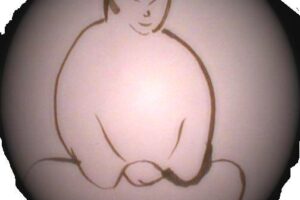
To close the trilogy on the three cardinal forms of sentient suffering listed in Buddhist teachings as aging, sickness and death, I have chosen the gerund form of the second. My prior pieces on the process of aging, witnessed primarily as my own, and dying, primarily that of my brother in his last days of living, reinforced for me the causal connection between the three, which I mentioned briefly in my “Casuality” Dharma Byte, in connection with the 12-fold Chain of Interdependent Origination, sometimes called the Chain of Causality.
But sickening has many meanings and associations, subtle shadings that are not the usual interpretation of conventional sickness. Following one of the most recent white-cop-on-unarmed-black-man fatal shootings, the police chief of the community, after viewing the passerby’s video of the incident, said he found it “sickening.” Events that go against our sensibilities as to what is acceptable, or normal, healthy behavior, are often characterized this way. We are sickened by the unexpected, especially if it is in the form of violent and senseless actions, resulting in the kind of suffering that is not only unnecessarily inflicted upon others, but seemingly willful or based on neurosis, fear, or hatred.
Chaos in nature, in the form of natural disasters such as storms, earthquakes, volcanoes erupting, and so on, is more acceptable than chaotic behavior in our fellow human beings. With the advent of open-carry, concealed carry, and ubiquitous handguns in general, we all feel potentially threatened, especially those in the socially-recognized minorities of race and color. While pundits on the conservative side may argue that police actions are “isolated incidents,” others see a pattern, and may be forgiven for not trusting members of our “finest,” who wear the uniform associated with the perpetrators of these actions.
One of the many ironies is that the very presence of guns forms an increased threat to those who are licensed to serve and protect, especially with the advent of armor-piercing bullets available for specially-designed handguns. A policeman today is in an analogous situation to the Samurai of old, wherein their life is in constant danger. One can forgive, to an extent, their tendency to be trigger-happy. I would not trade places with them. But that does not condone their actions, nor assume to understand their underlying motives.
For most of us, being sick means contracting a disease of some sort, and with the threat of the modern strains of influenza adapting to the medications developed to prevent their spread, we have more to worry about in that regard. As we age, we become more susceptible to threat from contagious diseases, and with the world-wide access to air travel, epidemics are becoming more difficult to contain, more likely to become pandemics. But I would like to speak of sickening in a more general sense, more related to the police chief’s reaction to the behavior of one of his officers.
As an aside, it is a quirk of the language that a word such as sickening acts as an adjective as well as a verb form. When we find something sickening, we are, after all, describing a feeling we have in reaction to the circumstance. We feel sick to our stomach, throwing up in revulsion, or simply from something we ate or drank, the latter such as overindulgence in alcohol. We all remember our first hangover, or at least most of us do, or should.
We can also become sick from ingesting too much of anything, as I did the first time I smoked tobacco. I stole a couple of packs of my dad’s cigarettes (Luckies and Pall Mall) and tried smoking them in the chicken coop. Of course, I panicked, realizing, or reasoning, in the way that only a young boy can, that I had to smoke them all, in order to get rid of the evidence. I was so sick that I was never interested in smoking cigarettes again. They did not taste nearly as good as they smelled, second-hand.
Another example is my brother’s birthday cake, one year that they made it look like a lamb with coconut frosting. Put me off the coconut, along with the ciggies.
But the kind of sickness pointed at in Buddhism’s definition of suffering, I think, goes beyond these obvious examples. If we remember that Buddha had become estranged from existence itself, owing to his extreme reaction to the suffering he had witnessed from the time he first became aware of his surroundings as an infant, as the story goes, we can see that the idea of sickness in Zen is intricately interrelated to suffering itself. The threshold emotion of encountering suffering in the world is a kind of inchoate, low-grade sickness, nausea, or sadness, at the apparently needless and heedless nature of it, especially that kind inflicted upon ourselves or others, on top of the natural suffering of aging, normal sickness, and dying.
And so I would propose that existence itself is somewhat sickening, in that regardless of how well our day may be going, just around the corner, or somewhere around the world, there is unspeakable suffering occurring at any time of the day or night. This, I think, is what put the young Siddhartha Gautama off his feed, and spoiled his fantasy of the good life, which he had every opportunity to enjoy. It is also true that our own life is careening largely out of our control. My father once said that it is like a merry-go-round that goes faster and faster and faster.
And then there is the level of the mistakes we all make in encountering life, including relations with siblings and parents, first encounters of the hormonal kind, and the aftermath of maturing in a world we do not really understand. When we look back on our life, we are often overcome with feelings of nostalgia or melancholy at what we coulda-woulda-shoulda done or not done. And of course, it is too late to go back and change the past. The most we can do is assimilate it into the present, through reforming our actions, many of which are out of our control, as it happens.
We would like to pretend, or imagine, that we have control at least over our own actions. But as the Repentance Verse reminds us, our past harmful karma arises from greed, anger and delusion, and is born of this body, mouth and mind. We cannot simply, by force of will and good intentions, change the very nature of our being. And so we continue making the same mistakes again and again. Or the changes we can affect, the new habits we can form, often amount to a difference without a distinction. We find ourselves at the same point of despair, another form of sickness. Which can lead to frustration, depression and even suicide. Which, according to Buddhism, instigates another round on the merry-go-round, grasping for the golden ring. Which, even if we catch it, simply awards us with another, “free” ride.
Meditation comes into this picture as our sanctuary, not from suffering, but in the midst of it. If there is any way to calmly confront the true conditions of our existence, simply sitting still begins to make sense. All of our other pursuits, either chasing after pleasure, or running away from pain, suffer from the same assumption: that we can and must “do” something about this situation, which we find, well, sickening. Our posture in zazen is, after all, one of surrender; we can neither flee, nor fight, in this cross-legged position.
Buddha sat down, the story goes, we may assume in some fairly high degree of frustration and/or desperation, at the end of six years of trying all kinds of extreme measures to overcome his anguish. With humility, he had to admit to himself that he did not know, fundamentally, what he most needed to know, despite all his efforts. Resolving to sit and die if necessary to resolve this conundrum, fortunately for us he survived, and later encouraged us to “do thou likewise.” He did not presume that anything he might say or do would work for anybody else; but that if we simply did the same thing that he had done — sitting still enough for long enough — that we might come to the same conclusion, or have the same insight, that he had had.
This is why Buddha is sometimes considered a doctor, or the first psychologist. Through his own example he diagnosed the sickness of the world (for human beings), and gave a prognosis and a prescription for therapeutic actions to be taken, in the form of the Four Noble Truths and the Noble Eightfold Path. What is noble about these teachings is, first of all, that they work; and that they hold true for all time and space. They do not change with circumstance.
The only way we can know this for sure, however, is to do likewise ourselves; to do what Buddha did. This is a great secret of Zen, and the only thing it actually transmits from generation to generation. It, Zen meditation, is good medicine for what ails us, but we have to be willing to stick with it, to take the whole prescription. Like many medicines, if we do not complete the treatment, it may only make the sickness worse.
So do not take my word for it. As Buddha taught, check it out for yourself. Just remember that it took him six years of solid practice, Bodhidharma nine years. And they weren’t fitting their meditation in, around the television and social media of the time. Their practice was 24/7. Don’t Americanize Zen, so that you expect instant gratification, or an overnight cure. The sickness is deeper than that, so the recovery is going to take some time. But be encouraged that the example of the ancestors assures us that this is “true, not false”; which we cannot say of the many brands of snake oil being peddled to us in this day and age. “If you do Zen for some time, you will realize all this. The treasure house will then open of itself, and you will be free to enjoy it to you heart’s content.” Thank you Dogen.








